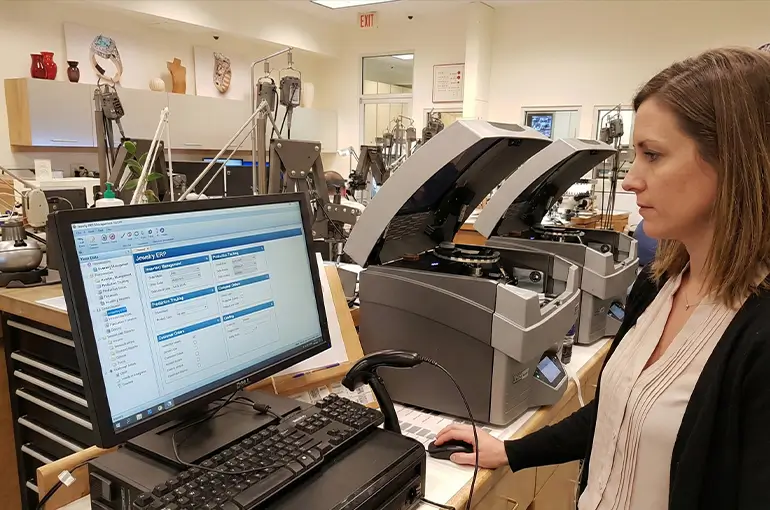![Illustration of ERP gears symbolizing enterprise resource planning systems]() Jewelry ERP software vs generic ERP
Jewelry ERP software vs generic ERP
This post we will discuss a few ways of simplifying an ERP selection process and will point out the differences between a jewelry ERP software and a generic ERP solution.
As mentioned in our previous post, the jewelry industry was in lack of an industry-specific software until recently. Those jewelry companies who needed a solution to automate parts of their business processes had no other choice than to use different systems for inventory tracking, customer tracking, and production tracking.
They were facing two major problems:
- the lack of key functionalities for handling industry-specific item type configurations or processes
- these separate systems didn’t or hardly communicate with each other
No other choice left then implementing a generic ERP, with all the functional limitations and difficulties.
Some companies developed in-house solutions to cover the gaps they met when searching for a jewelry software vendor. Developing an in-house, custom ERP solution may sound like the perfect solution, however the financial investment rarely pays off as technology and maintanace costs (IT department included) usually go higher than benefits. This topic will be covered in a later post.
Jewelry ERPs are basically vertical ERPs because of their industry-specific nature, typically they are operating on a niche market.
Can a non-jewelry ERP software meet the needs of a jewelry business?
In our opinion no, because these systems often can't meet the objectives of a jewelry business, since they lack key functionalities. Generic ERPs were designed to fit "any businesses", trying to vertically extend a core product for different industries (e.g. Microsoft Dynamics NAV). Does that software vendor understand jewelry industry specifications? Highly doubtful. Instead, they leave companies with a number of issues:
- high software customization costs
- high maintenance fees
- functional incompatibilities
- partially automated workflows
- the support team of the ERP vendor doesn't understand industry-specific issues
A long term partnership with a vendor who understands the unique requirements of the industry will increase your chances of a successful project and contribute to a fast ROI.
Jewelry specific ERP software modules typically offer deeper functionality for your specific business and operation needs than a generic ERP package. An ERP application developed specifically for your industry is better equipped to handle your manufacturing processes with minimal or no customization. This means faster, more affordable implementation and maintenance.
Please like and share if you found this article useful! Or schedule a free online demo of PIRO jewelry software.
FAQ: Jewelry ERP vs Generic ERP - 5 Key Differences
- Why are generic ERPs often a poor fit for jewelry businesses?
They lack jewelry-specific functionality, such as item type configurations, and usually don't integrate seamlessly with other necessary systems, leading to fragmented workflows. - What are the hidden costs of deploying a generic ERP in jewelry operations?
Using a generic ERP involves high customization fees, ongoing maintenance costs, workflow inefficiencies, functional mismatches, and vendors who lack industry-specific expertise. - Why is a jewelry ERP considered a vertical ERP?
Jewelry ERP solutions are industry-tailored, built to address the specific workflows of jewelry manufacturing and retail. This minimizes the need for disruptive custom development. - How does a jewelry ERP achieve faster and more affordable implementation?
Because it’s designed for the jewelry industry, such a system handles manufacturing and operational needs out-of-the-box - requiring little to no customization - making deployment and maintenance quicker and cheaper. - How can partnering with a jewelry ERP vendor increase your odds of project success?
Working with a vendor that truly understands your industry means better alignment, faster ROI, fewer missteps, and a long-term partnership that supports software and business growth.


 Jewelry ERP software vs generic ERP
Jewelry ERP software vs generic ERP